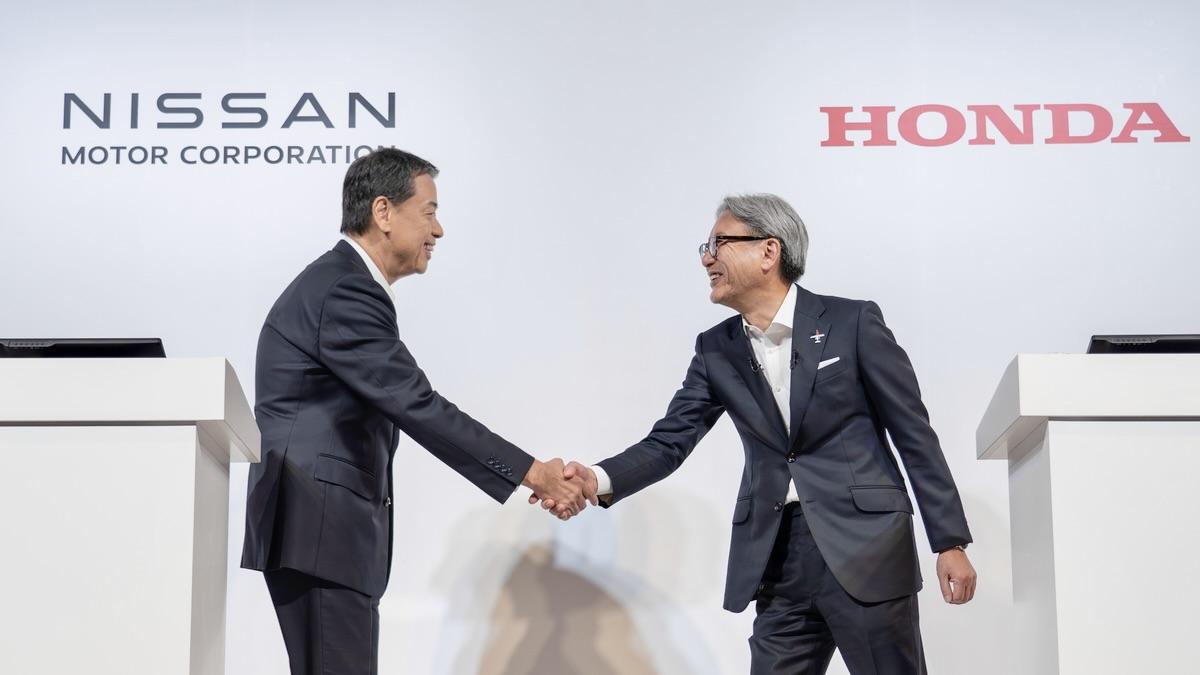Factory sharing between Honda and Nissan could reshape their global presence as they navigate uncertainties tied to Trump’s policies. Talks highlight their strategic efforts to streamline operations and secure a competitive edge in the automotive industry.
Honda and Nissan Eye Factory Collaboration for Strategic Growth
According to Saturday's report by Japan's Kyodo news agency (via Investing.com), as part of their strategy to strengthen connections and maybe merge, Honda and Nissan are contemplating the possibility of manufacturing vehicles in each other's plants.
Without specifying where the information came from, the report stated that Honda is contemplating offering hybrid automobiles to Nissan as part of the strategy.
After Toyota and Volkswagen, the combined annual production of 7.4 million vehicles would make the combined business the third-biggest auto group in the world. This would be achieved through the merging of Nissan and Honda, the two largest auto companies in Japan.
Although the two car companies formed a strategic alliance in March to work together on electric vehicle development, Nissan has been having some serious issues as of late, both financially and strategically.
A Merger Could Create the World’s Third-Biggest Auto Group
In response to a question regarding the report, a Honda spokeswoman stated, "Nissan and Mitsubishi Motors are in the process of bringing together our strengths and exploring potential forms of cooperation, but nothing has been decided yet," as previously indicated by Honda.
Because the report did not cite an official announcement from Nissan, the automaker chose not to respond. Mitsubishi Motors' largest shareholder is Nissan.
According to Kyodo, Honda might make use of Nissan's automobile facility in the United Kingdom because the company currently only has factories in Europe that produce motorcycles and engines.
Trump’s Trade Policies Add Complexity to Manufacturing Strategy
This decision comes at a time when there are concerns regarding the potential for President-elect Donald Trump's policies to disrupt the manufacturing industry, as the article stated that Trump has promised to implement protectionist trade policies.



 Trump Lifts 25% Tariff on Indian Goods in Strategic U.S.–India Trade and Energy Deal
Trump Lifts 25% Tariff on Indian Goods in Strategic U.S.–India Trade and Energy Deal  South Africa Eyes ECB Repo Lines as Inflation Eases and Rate Cuts Loom
South Africa Eyes ECB Repo Lines as Inflation Eases and Rate Cuts Loom  India–U.S. Interim Trade Pact Cuts Auto Tariffs but Leaves Tesla Out
India–U.S. Interim Trade Pact Cuts Auto Tariffs but Leaves Tesla Out  Dollar Near Two-Week High as Stock Rout, AI Concerns and Global Events Drive Market Volatility
Dollar Near Two-Week High as Stock Rout, AI Concerns and Global Events Drive Market Volatility  Vietnam’s Trade Surplus With US Jumps as Exports Surge and China Imports Hit Record
Vietnam’s Trade Surplus With US Jumps as Exports Surge and China Imports Hit Record  South Korea Assures U.S. on Trade Deal Commitments Amid Tariff Concerns
South Korea Assures U.S. on Trade Deal Commitments Amid Tariff Concerns  Bank of Japan Signals Readiness for Near-Term Rate Hike as Inflation Nears Target
Bank of Japan Signals Readiness for Near-Term Rate Hike as Inflation Nears Target  China Extends Gold Buying Streak as Reserves Surge Despite Volatile Prices
China Extends Gold Buying Streak as Reserves Surge Despite Volatile Prices  Singapore Budget 2026 Set for Fiscal Prudence as Growth Remains Resilient
Singapore Budget 2026 Set for Fiscal Prudence as Growth Remains Resilient  U.S. Stock Futures Slide as Tech Rout Deepens on Amazon Capex Shock
U.S. Stock Futures Slide as Tech Rout Deepens on Amazon Capex Shock  Japan Economy Poised for Q4 2025 Growth as Investment and Consumption Hold Firm
Japan Economy Poised for Q4 2025 Growth as Investment and Consumption Hold Firm  U.S.-India Trade Framework Signals Major Shift in Tariffs, Energy, and Supply Chains
U.S.-India Trade Framework Signals Major Shift in Tariffs, Energy, and Supply Chains  Gold and Silver Prices Slide as Dollar Strength and Easing Tensions Weigh on Metals
Gold and Silver Prices Slide as Dollar Strength and Easing Tensions Weigh on Metals  South Korea’s Weak Won Struggles as Retail Investors Pour Money Into U.S. Stocks
South Korea’s Weak Won Struggles as Retail Investors Pour Money Into U.S. Stocks  RBI Holds Repo Rate at 5.25% as India’s Growth Outlook Strengthens After U.S. Trade Deal
RBI Holds Repo Rate at 5.25% as India’s Growth Outlook Strengthens After U.S. Trade Deal  Dow Hits 50,000 as U.S. Stocks Stage Strong Rebound Amid AI Volatility
Dow Hits 50,000 as U.S. Stocks Stage Strong Rebound Amid AI Volatility  Gold Prices Slide Below $5,000 as Strong Dollar and Central Bank Outlook Weigh on Metals
Gold Prices Slide Below $5,000 as Strong Dollar and Central Bank Outlook Weigh on Metals 































